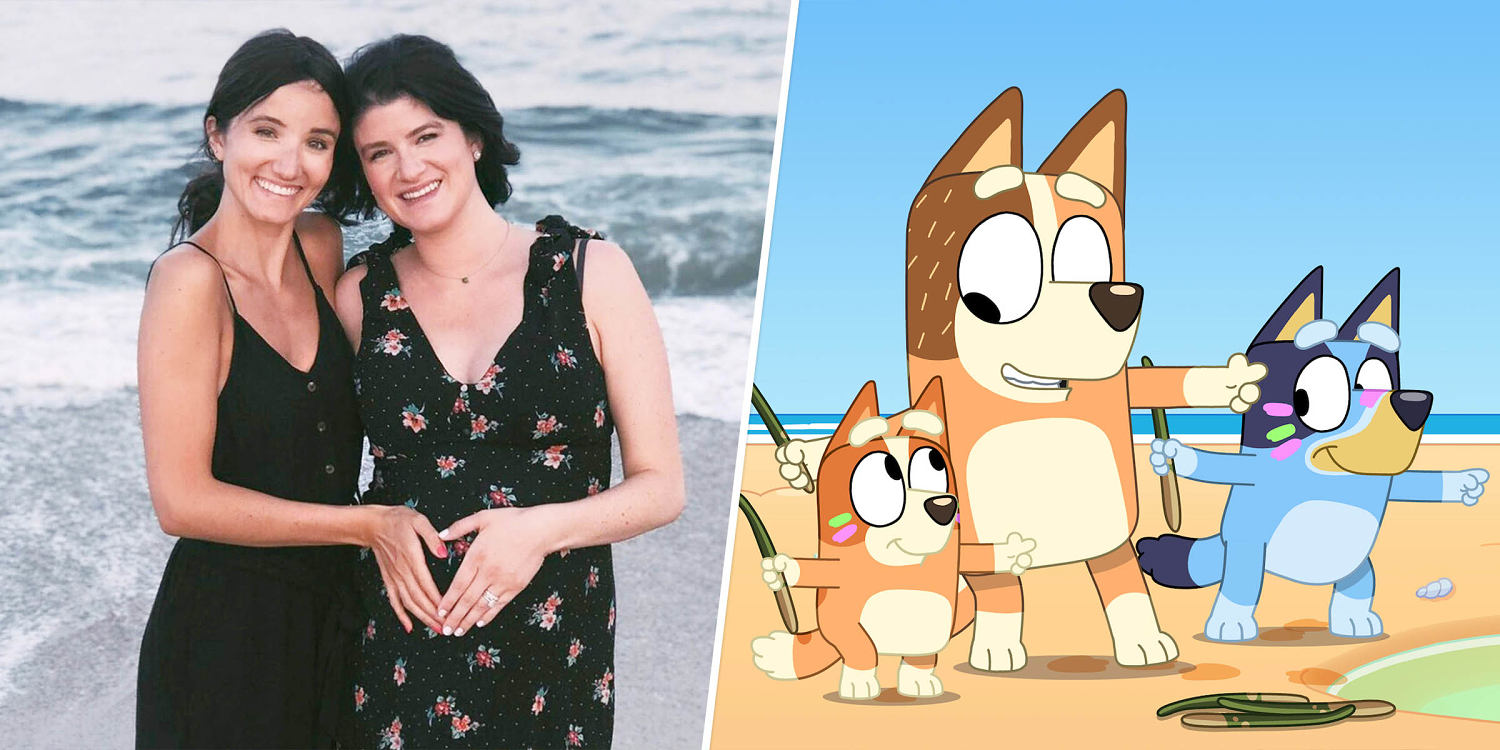The jaunty intro music plays and two tiny heads whip toward the television. I settle onto the couch with my young sons and some of my stress melts away because I’ll have the next seven-ish minutes to feed myself, complete a small task, scroll, or just sit and enjoy with them. Usually, I choose to watch.
Like many adults, I’ve fallen in love with the Heeler family. My husband and I routinely lust after their house. We cry as the emotional roller coaster of parenthood is reflected back at us.

For me, the show has also been a surprisingly useful tool: Bluey and Bingo are helping me grieve. As I snuggle my boys, their small bodies constantly wiggling, their tiny hands and pudgy feet overlapping with mine, I float back to the hospital bed set up in my parents’ living room, poorly disguised with bright sheets. I held my little sister Kelsey’s hands and they were as soft as my sons’ are now.
I snuggled up with her the same way, two years ago, as we helped her die. was torturous but precious. My family had the gift of time to say goodbye.
Each day I laid with her, I knew it could be the last. She couldn’t speak, but I believe she heard me, felt me and found peace in the closeness we’d been sharing since she was born. She was 31, two years younger than me, and I begged the universe for another minute, another day, while simultaneously wanting her suffering to end.
Every time I drove away from my childhood home to return to my own child, my heart beat out of my chest and the air left my lungs. I expected the grief after her death to feel like falling off a cliff into the ocean, but it wasn’t. I’d been grieving for Kelsey for years.
I’d swung between fight, flight and freeze for as long as we knew she had cancer, close to a decade. I’d bargained with the universe and convinced myself that science would advance enough to allow her to live. I betrayed my own faith that she wouldn’t die by cataloging moments in my mind, just in case.
I have a hard time remembering many things but can close my eyes and see Kelsey singing along with George Ezra at his concert. I can play the memory on a loop and be right there, swaying next to her. Before I became a parent, I didn’t appreciate the value of my personal time.
Uninterrupted visits to the bathroom, full nights of sleep, and a gym membership I actually used. I could ignore my emotions without fear of them bubbling back up at an inconvenient time, like during a toddler tantrum, when they might overtake me and turn me into a person I don’t want to be with my kids. I don’t know how I would have experienced her death if I wasn’t a parent.
But as a relatively new mom, I function as someone’s parent first and an autonomous person second. Grief is highly inconvenient. Prior to my sister’s death, what I feared most was a life without her.
Our lives and spirits were entwined. There was no me without her. I feared the version of me that would be left without her.
The specter of the woman I might become haunted me; so, I refused myself the freedom to grieve the way I needed. Instead I limped along, missing a piece. I function as someone’s parent first and an autonomous person second.
Grief is highly inconvenient. ..
. I refused myself the freedom to grieve the way I needed. Instead I limped along, missing a piece.
To me, the depiction of the parent who checks out and lays in bed all day or goes off the rails is unrealistic luxury. I had little time to myself after Kelsey died. I walked around the house like a ghost.
I looked for her around every corner and convinced myself she was speaking to me through her favorite songs. When I wasn’t talking to flickering light fixtures, I was entertaining a demanding toddler who had no clue what was going on. I would take a shower to cry.
I dressed slowly and then came downstairs in mom-mode. Sobbing over Play-Doh would be scary. Melting down at the playground would lose my kid playdates.
All that emotion locked up tended to come out on car rides to work or the grocery store. But driving and crying isn’t really recommended, so that ended too. Instead, it manifested as rage and anxiety, and still does.
But I guess extra visits to the pediatrician and screaming at one’s husband don’t make for great entertainment so the grief tropes live on, unchanged. In the Apple TV+ show, Harrison Ford’s character recommends a grieving daughter set a timer, pick a sad song, and feel deeply for 15 minutes. I could and should try this, but keep forgetting.
What I don’t forget? My own kid’s screen time — he wouldn’t let me. That’s how I found myself one weekend watching the episode, “Relax.” In it, the Heeler family stay at a hotel and Bluey’s mom, Chilli, cannot remember how to relax and enjoy herself.
She finally steps back, watches her daughters and sees the joy they feel being together, exploring a new space. It was the sisters’ creative play that caught me off guard. Giddy over hotel soap, dressing as mermaids, over the moon to take a bath in a big fancy tub.
I was back in my childhood. Dressing up, playing school and making witch’s brew with sand, rocks and dandelions. Reliving the memories loosened the grip I normally kept on my emotions.
For the first time in months, I cried without worry. My baby was sleeping and my older son was glued to the screen, paying no attention to me or my tears. For once, I had my moment of deep sadness without having to hide or protect someone else from my feelings.
Afterward I felt, not better really, but different. Maybe more peaceful, but definitely more connected to my sister through the memories “Bluey” brought to the surface. The episode only lasted a few minutes, but it was long enough to shift something for me.
For a little while I was smiling through my tears, able to let joy in with the sadness. Remembering the moments that shaped us, that solidified our bond as sisters and best friends, was a gift. We’ve watched the rest of the season, and each episode was better than the last.
has opened a window I’d shut tight and helped me recall happy and hard childhood moments, all of which include Kelsey. My child-self misses her sister in such an acute way it feels like an injury. My current self is forced to acknowledge what her absence means — an endless list of what could have been.
It’s been two years and now I’m less afraid of marinating in grief and getting trapped there. I welcome the cherished memories that leave me feeling the warmth of a hug. They are evidence of a deep love and enduring connection that cannot be erased.
I’m grateful that celebrates the special relationship of sisters and for the wonder it inspires in its viewers. Mostly, I’m thankful that Bluey and Bingo’s love for one another has helped me process grief through memories in a safe little seven-minute package. The episodes’ brevity forces me and allows me to feel deeply; it is a reminder of how fast this life goes and that the credits will roll on my memories all too soon.
Caitlin Flanigan is a New Jersey-based writer, speech language pathologist and founder of . She writes about parenthood, family and the messy parts of life with the support of , a community of writers she helped create in 2020. She is currently querying a novel.
.


















